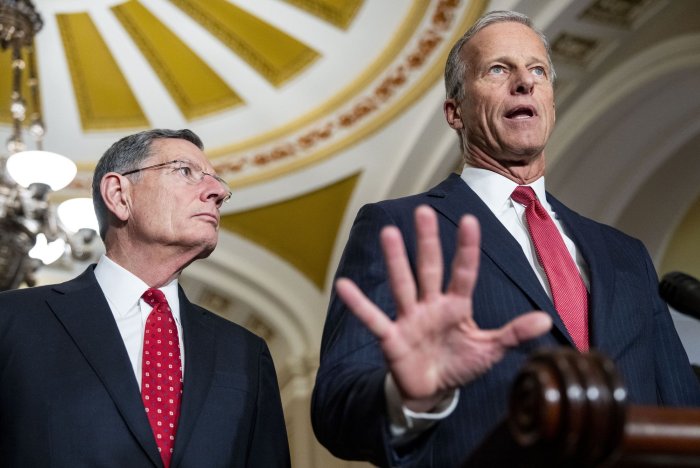House votes to block Canada tariffs in rare rebuke of Trump
Feb. 12 (UPI) — In a rare rebuke of the Trump administration, the Republican-led House on Wednesday moved to block sweeping tariffs imposed on Canada by President Donald Trump.
In a 219-211 vote on Wednesday evening, House lawmakers approved legislation terminating a national emergency Trump declared early in his administration to slap tariffs on the United States’ northern neighbor.
Six Republicans joined their Democratic colleagues to pass the legislation into an uncertain future in the Senate. One Democrat, Rep. Jared Golden of Maine, voted against terminating the emergency.
The legislation, however, could end up being only symbolic. Even if the GOP-led majority approves it, President Donald Trump would be expected to veto it.
Even as the resolution faces an uncertain future, Rep. Gregory Meeks, D-N.Y., the ranking member of the House Foreign Affairs Committee and sponsor of H.J.Res.72, said Democrats, joined by several GOP lawmakers, forced the measure to the floor to put Republicans on record.
“The question was simple: stand with working families and lower costs, or keep prices high out of loyalty to Donald Trump?” Meeks, who has argued the tariffs have increased household costs, said in a statement following the vote.
“House Democrats will continue fighting to lower costs, even if most Republicans won’t.”
Tariffs have been a mechanism central to Trump’s trade and foreign policy, using economic measures to right what he sees as improper trade relations and to penalize nations he feels are doing him and the United States wrong.
On Feb. 1, Trump declared a national emergency with respect to Canada over drugs entering the United States across their shared border, alleging Ottawa was “failing to devote sufficient attention and resources or meaningfully coordinate with the United States law enforcement partners to effectively stem the tide of illicit drugs.”
Under the International Emergency Economic Powers Act, Trump imposed a sweeping 25% tariff on most Canadian goods and a 10% duty on Canadian energy products.
The tariffs have kicked off a trade war with Canada and have begun fraying the United States’ relations with Ottawa, which, in the months since, has sought to lessen its dependency on Washington.
Premier Doug Ford of Ontario, Canada’s most populous province, on Wednesday night thanked the members of Congress who voted to terminate the emergency declaration, saying they “stood up in support of free trade and economic growth between our two great countries.”
“An important victory with more work ahead,” he said in a social media statement.
“Let’s end the tariffs and together build a more prosperous and secure future.”
Trump lashed out against House and Senate Republicans on Wednesday, warning that those who vote against his tariffs “will suffer the consequences come Election time,” suggesting that he could interfere with their chances of winning their next primary.
The president argued in a post on his Truth Social platform that tariffs improve the United States’ economic and national security “because the mere mention of the word has Countries agreeing to our strongest wishes.”
“Tariffs have given us Economic and National Security, and no Republican should be responsible for destroying this privilege,” he said. In a second post, Trump said Canada was taking advantage of the United States without providing proof, calling Ottawa “the worst in the World to deal with.”
“TARIFFS make a WIN for us, EASY,” he said. “Republicans must keep it that way!”
Democrats have criticized Trump’s tariffs since they were announced, and now point to economists’ estimates that say the measures — including those imposed against Canada — have increased household costs.
According to the Budget Lab at Yale University, income loss due to Trump’s tariffs, including those imposed on Canada, amounted to about $1,700 per American household last year. The nonpartisan Tax Foundation said the tariffs amount to an average tax increase per U.S. household of $1,000 in 2025 and $1,300 this year.
Though estimates vary, economists generally agree that the tariffs have raised costs for American households.
The U.S.-Canada relationship has greatly degraded during Trump’s second term. Threats to make Canada the United States’ 51st state, his imposition of tariffs and the shifting right of Washington’s foreign and domestic policies have prompted officials in Ottawa to look elsewhere for stable economic partnerships.
Last month, Trump threatened to impose a 100% tariff on Canadian imports in response to Canada seeking to forge a new trade deal with China.
Last October, the U.S. Senate passed a similar resolution to end the emergency declaration related to Canada, but the GOP-led House did not take it up before the end of the congressional session.
In the courts, the legality of Trump’s tariffs is being challenged by multiple lawsuits, with opponents, including states and companies, arguing that the president exceeded his authority in imposing the taxes, which historically are Congress’ responsibility as holder of the purse.





